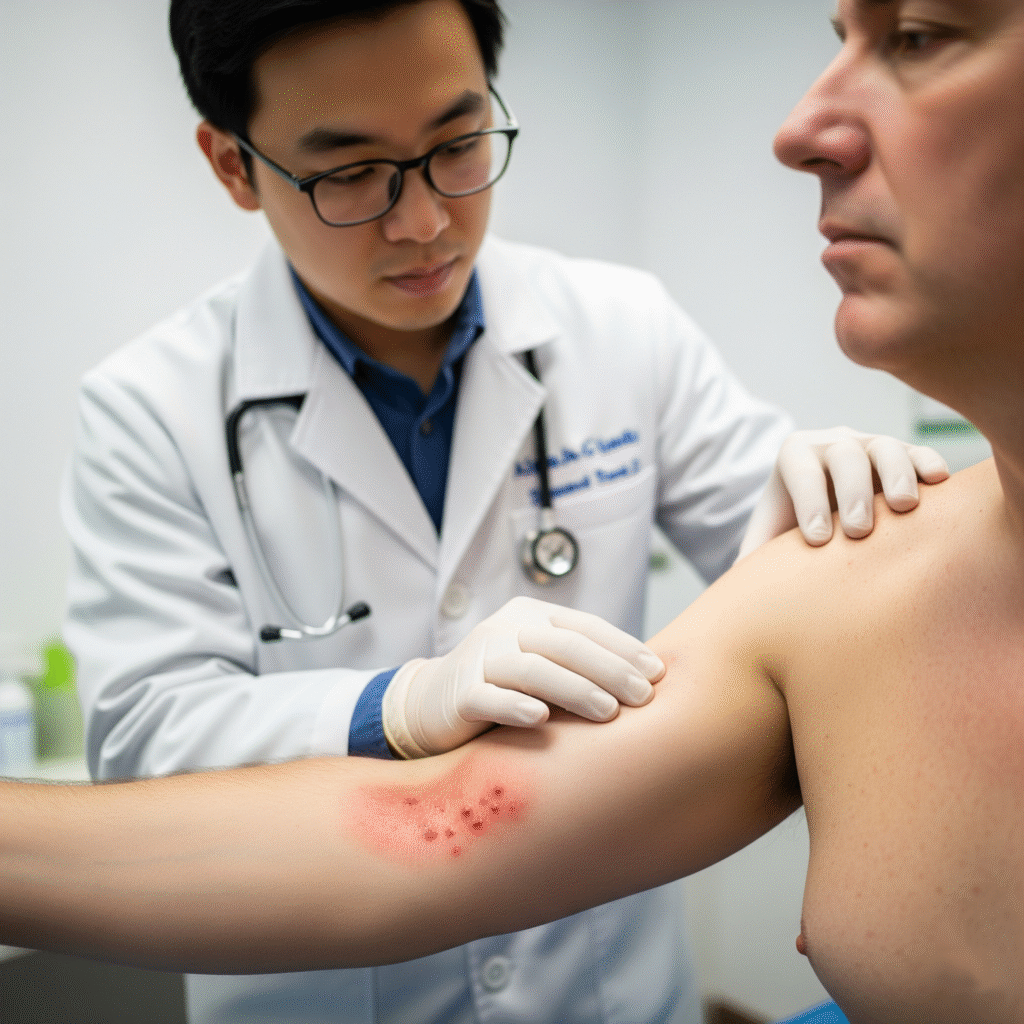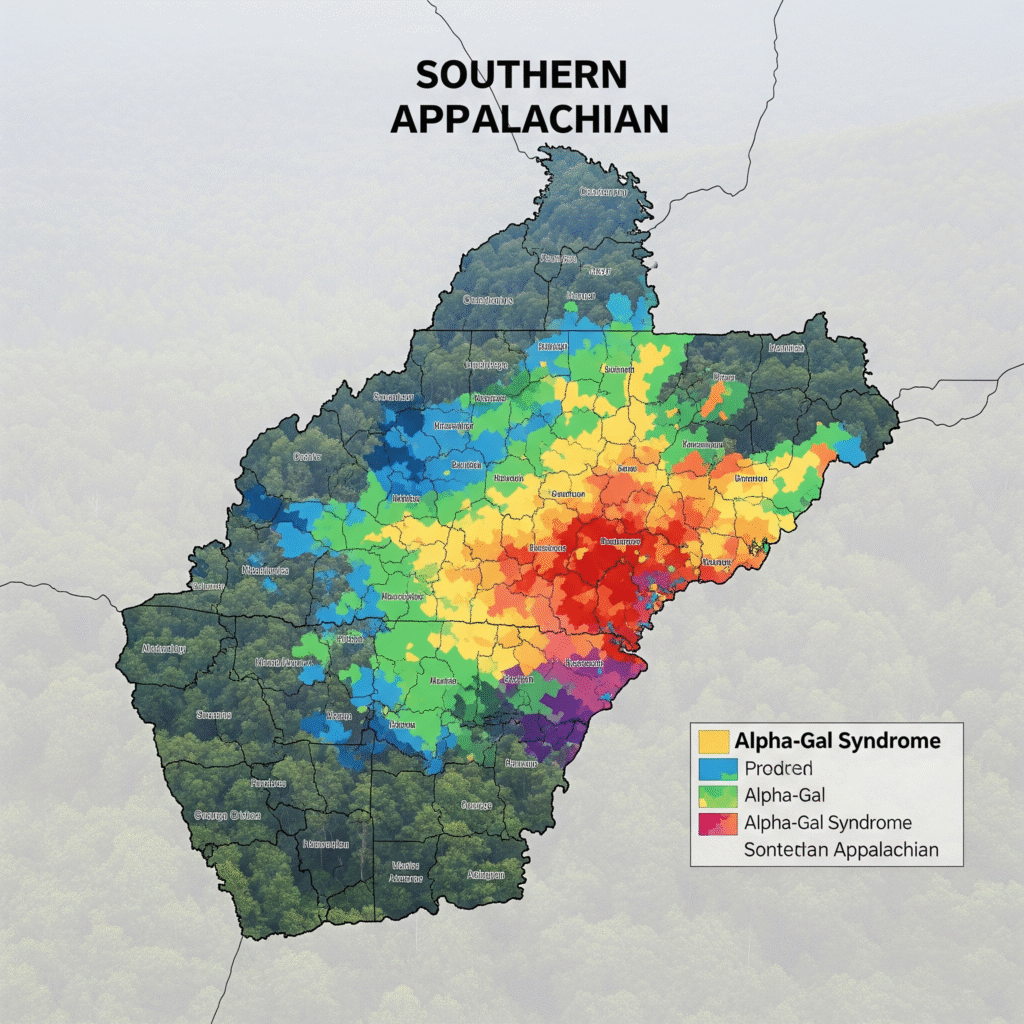
Alpha-gal syndrome (AGS), a fascinating and often debilitating allergic condition, presents as a delayed hypersensitivity reaction to the carbohydrate galactose-alpha-1,3-galactose (alpha-gal). This unique allergy challenges conventional understandings of food allergies due to its delayed symptom onset and carbohydrate target. Its rising prevalence, particularly in tick-endemic regions like Southern Appalachia, underscores the need for increased scientific understanding, effective diagnostic strategies, and innovative management solutions, including the groundbreaking development of alpha-gal safe pork.

Etiology and Pathophysiology: Unraveling the Tick-Alpha-Gal Connection
The genesis of AGS in the United States is overwhelmingly linked to the bite of the Lone Star tick (Amblyomma americanum). When this tick feeds on a human, it introduces alpha-gal, a sugar molecule naturally present in its saliva and in the tissues of non-primate mammals. For certain individuals, this exposure triggers the production of immunoglobulin E (IgE) antibodies specifically targeting alpha-gal [Mayo Clinic, 2022].
The mechanism behind this sensitization is a subject of ongoing research. It is hypothesized that the tick bite, in addition to introducing alpha-gal, may also deliver other factors that promote an IgE response, potentially by disrupting the immune system’s tolerance to the carbohydrate. Unlike typical IgE responses to protein allergens, which often involve T-cell activation, the IgE antibody production to alpha-gal is believed to have distinct immunological pathways, though the precise T-cell involvement in this carbohydrate-specific IgE response remains an important area of study [PMC, 2016].
Upon subsequent ingestion of mammalian meat (e.g., beef, pork, lamb, venison) or other mammal-derived products (e.g., dairy, gelatin, certain medications), the pre-existing IgE antibodies bind to alpha-gal present in these products. This binding triggers the release of histamine and other inflammatory mediators from mast cells and basophils, leading to the characteristic allergic symptoms [Mayo Clinic, 2022].
The delayed onset of symptoms, typically 3-6 hours post-ingestion, is a defining feature of AGS. This lag is primarily due to the time required for alpha-gal to be absorbed from the gastrointestinal tract. Alpha-gal in mammalian meat is often embedded in fatty tissues and requires enzymatic digestion and absorption as lipid-bound forms, a process that is slower than the absorption of protein allergens [Marshall Digital Scholar, 2020; PMC, 2022]. Factors known to modulate the timing and severity of reactions include:
- Fat content of the meal: Higher fat content can delay absorption and potentially lead to more severe reactions as alpha-gal is more concentrated in fatty tissues.
- Alcohol consumption: Alcohol can increase gut permeability and accelerate absorption, potentially leading to earlier or more intense reactions.
- Exercise: Physical activity can also influence gut motility and absorption, sometimes exacerbating symptoms [Marshall Digital Scholar, 2020].
- Tick re-exposure: Subsequent tick bites can boost alpha-gal IgE levels, increasing sensitivity and the likelihood of more severe reactions [Cleveland Clinic, 2024].
While the Lone Star tick is the predominant vector in the U.S., other tick species, such as Ixodes scapularis (black-legged tick), have been implicated in some cases, and AGS has been reported globally, highlighting the involvement of various tick species in different geographical regions [Mayo Clinic, 2022; PLOS, 2023].

Clinical Manifestations and Diagnostic Challenges
The presentation of AGS is highly variable, ranging from mild dermatological symptoms to life-threatening anaphylaxis. Common symptoms include:
- Dermatologic: Urticaria (hives), pruritus (itching), and angioedema (swelling of facial features, throat, or other body parts).
- Gastrointestinal: Abdominal pain, nausea, vomiting, diarrhea, and dyspepsia (indigestion). Importantly, isolated gastrointestinal symptoms are not uncommon and can frequently lead to misdiagnosis as Irritable Bowel Syndrome (IBS) or other digestive disorders, contributing to diagnostic delays [PMC, 2021; CCJM, 2025].
- Respiratory: Wheezing, shortness of breath, and chest tightness.
- Cardiovascular: Dizziness, lightheadedness, syncope (fainting), and hypotension (low blood pressure), culminating in anaphylactic shock in severe cases [Mayo Clinic, 2022]. Anaphylaxis occurs in up to 75% of AGS patients, making it a significant cause of adult-onset anaphylaxis, sometimes surpassing other food allergies in high-prevalence areas [Alpha-gal Action Fund, 2024].
The diagnostic process for AGS can be challenging due to several factors:
- Delayed reaction: The typical 3-6 hour delay makes it difficult for patients to connect their symptoms to specific food intake. Reactions often occur in the middle of the night or late evening, further obscuring the link [Cleveland Clinic, 2024].
- Variable symptoms: The wide range of symptoms, including gastrointestinal-only presentations, can mimic other conditions.
- Unremembered tick bites: Tick bites are often painless, and many individuals who develop tick-borne illnesses do not recall being bitten [CCJM, 2025].
- Lack of awareness among healthcare providers: A significant number of healthcare professionals (up to 78%) have limited knowledge of AGS, leading to underdiagnosis and misdiagnosis, with an average diagnosis time of over 7 years for patients [Alpha-gal Action Fund, 2024].
Diagnosis typically involves:
- Detailed clinical history: Including a thorough review of delayed allergic reactions after mammalian meat consumption and history of tick exposure or outdoor activities in endemic areas.
- Serum IgE antibody testing to alpha-gal: A positive test for specific IgE antibodies to alpha-gal (e.g., >0.1 IU/mL) in the context of clinical symptoms strongly supports the diagnosis. Skin prick tests with mammalian meat extracts are generally unreliable and not recommended for diagnosis [PMC, 2021; CCJM, 2025].
- Oral food challenges: While considered the gold standard for food allergy diagnosis, the delayed nature of AGS reactions makes controlled oral food challenges cumbersome and impractical for routine clinical practice. They are generally reserved for cases where serologic testing is inconclusive or to confirm resolution of the allergy [CCJM, 2025].

Prevalence in Southern Appalachia: A Regional Hotspot
The Southern Appalachian region is a recognized hotspot for AGS due to the abundant presence of the Lone Star tick. The CDC reported that the highest prevalence of positive alpha-gal IgE test results in the U.S. is concentrated in a contiguous region spanning the southern, midwestern, and mid-Atlantic states, which directly includes large portions of Virginia, Tennessee, and North Carolina [CDC MMWR, 2023]. Some areas within these high-prevalence zones may see sensitization rates to alpha-gal affecting 15% to 35% of the population, although clinical AGS occurs in a smaller subset (1% to 8%) of sensitized individuals [CCJM, 2025].
Environmental factors such as warmer surface temperatures and longer summers contribute to the expansion of tick populations and their geographic range. Human factors, including increased outdoor recreational activities and the reforestation of previously developed areas, create more suitable habitats for Amblyomma americanum, which thrives in mixed forests and areas of open space development frequently found in the Appalachian fringe [PLOS, 2023]. White-tailed deer, a major host for Lone Star ticks, are also abundant in this region, further contributing to tick proliferation and the spread of AGS [PMC, 2016].
Treatments and Scientific Advancements
Currently, there is no curative treatment for AGS. Management revolves around strict avoidance of alpha-gal-containing products and preventing further tick bites.
- Dietary Avoidance: This involves eliminating mammalian meat (beef, pork, lamb, venison, rabbit, etc.), organ meats, and products made with mammalian fat (lard, tallow), gelatin, or certain dairy products. Individual tolerance varies, and some patients may tolerate dairy [CDC, Products That May Contain Alpha-gal, 2024].
- Symptomatic Management: Antihistamines can alleviate mild symptoms. Epinephrine auto-injectors are critical for managing severe reactions and anaphylaxis, and patients are typically prescribed these devices.
- Tick Bite Prevention: Essential for preventing new sensitizations or re-sensitization in affected individuals. This includes using EPA-approved insect repellents, wearing protective clothing, and performing thorough tick checks after outdoor activities [Mayo Clinic, 2022].

Significant scientific advancements are underway, offering hope for improved management and potential therapeutic interventions:
- GalSafe Pigs: In a landmark decision, the U.S. FDA approved genetically engineered GalSafe pigs in 2020. These pigs have a specific gene edited out, preventing them from producing alpha-gal sugar on their cell surfaces [FDA, 2020]. This represents a monumental step towards providing a safe red meat option for individuals with AGS.
- Monoclonal Antibodies: Researchers are actively exploring the development of alpha-gal-specific monoclonal antibodies (mAbs). IgGenix, a biotechnology company, recently announced the discovery of over 60 alpha-gal-specific mAbs from allergic individuals. This research aims to identify antibodies that can block or prevent the allergic cascade, potentially leading to breakthrough treatments for AGS and other immune-mediated diseases [BioSpace, 2025; PR Newswire, 2025]. Such therapies could potentially desensitize individuals or prevent reactions upon inadvertent exposure.
- Understanding Immune Mechanisms: Ongoing research continues to unravel the unique immunological mechanisms underlying AGS, which differ from conventional protein allergies. A deeper understanding of these pathways could pave the way for more targeted and effective treatments.
Alpha-Gal Safe Pork: Production and Handling
The production of GalSafe pork involves advanced genetic engineering techniques. The specific genomic alteration (IGA) targets the gene responsible for the enzyme that synthesizes the alpha-gal epitope. This ensures that the pigs do not produce alpha-gal in their tissues [FDA, 2020]. These animals are raised under controlled conditions to maintain their alpha-gal-free status.
For consumers with AGS, proper handling of GalSafe pork is critical to prevent cross-contamination with conventional mammalian meats, which could still trigger a reaction. Key handling considerations include:
- Dedicated Utensils and Surfaces: Use separate cutting boards, knives, and cooking utensils exclusively for alpha-gal safe pork.
- Separate Cooking Equipment: Avoid cooking GalSafe pork on grills, griddles, or in fryers that have been used for conventional mammalian meat. Even residual alpha-gal from fats or airborne particles can cause reactions in highly sensitive individuals.
- Thorough Cleaning: Meticulously clean all surfaces and equipment that come into contact with GalSafe pork before and after use.
- Storage: Store GalSafe pork separately from other meats to prevent accidental cross-contamination.
- Ingredient Awareness: While the pork itself is alpha-gal free, consumers must remain vigilant about other ingredients in prepared products. For example, some cured or smoked GalSafe pork products may not yet be available, and any added ingredients (like certain casings for sausages) should be verified [Amaroo Hills Emu Farm, GALSAFE® PORK, n.d.].
While GalSafe pork offers a revolutionary dietary option, its commercial availability is still developing. Initial distribution has largely been through direct-to-consumer channels, such as mail order from specialized farms [Amaroo Hills Emu Farm, GALSAFE® PORK, n.d.]. The developer, Revivicor, Inc., has recently entered into agreements with partners to expand the herd and anticipate broader commercial sales [YouTube, The regulatory journey of the GalSafe pig, 2024].
List of Certified Meat Packing Plants in Western Virginia, Eastern Tennessee, and Northern North Carolina
It is important to clarify that “certified alpha-gal safe” is not a standard USDA designation that applies broadly to all meat packing plants. Rather, it refers specifically to the processing of GalSafe pork, which is a proprietary product. The USDA inspects all meat processing facilities for general food safety and quality. However, the specific claim of “alpha-gal safe” for mammalian meat is currently unique to GalSafe pigs and their specific processing.
Therefore, the list below focuses on facilities that are either explicitly noted as selling GalSafe pork or are known to offer non-mammalian alternatives that are inherently alpha-gal free. Consumers with AGS must always verify directly with the supplier regarding their alpha-gal safe practices and the origin of their products.

Western Virginia:
- Washington County Meat Packing
- Address: 2505 Campground Rd, Bristol, VA
- Phone: (276) 791-0533
- Notes: Listed as selling GalSafe pork, with limited quantities available. USDA inspected facility. It is crucial to call ahead and confirm current availability and specific handling protocols for GalSafe pork. [Alpha-gal Information, Red meat alternatives, n.d.]
Eastern Tennessee:
- Amaroo Hills Emu Farm (Also has a NC location)
- Address: Farm location in Ashland City, TN (check website for specific processing/distribution points)
- Phone: (615) 510-7542
- Notes: Known for providing non-mammalian emu meat as an alternative and explicitly states a mission to provide safe red meat for those with Alpha-Gal. They are listed as distributing GalSafe pork and lard. [Amaroo Hills Emu Farm, About Us, n.d.; Amaroo Hills Emu Farm, GALSAFE® PORK, n.d.]
Northern North Carolina:
- Amaroo Hills Emu Farm (Also has a TN location)
- Address: Farm location in Liberty, NC (check website for specific processing/distribution points)
- Phone: (615) 510-7542 (central contact, verify if NC location has separate direct line)
- Notes: Similar to their Tennessee operation, they are noted for offering GalSafe pork products. [Amaroo Hills Emu Farm, About Us, n.d.; Amaroo Hills Emu Farm, GALSAFE® PORK, n.d.]
Important Disclaimer for all listed facilities: The availability of GalSafe pork is still somewhat limited and may be subject to supply. It is crucial for individuals with AGS to directly contact any meat provider and explicitly inquire about:
- If they sell GalSafe pork.
- Their specific handling and processing procedures to prevent cross-contamination with conventional meats.
- Whether any other ingredients (e.g., casings, marinades) in their products contain alpha-gal.
Conclusion
Alpha-gal syndrome represents a significant and evolving health concern, particularly within the Southern Appalachian region. Its unique tick-induced carbohydrate allergy mechanism and delayed symptom onset pose considerable diagnostic and management challenges. However, ongoing scientific research is rapidly advancing our understanding of AGS, with promising developments in diagnostics and potential treatments, including novel monoclonal antibody therapies. The FDA’s approval of GalSafe pigs marks a groundbreaking stride, offering a safe red meat option that can significantly improve the quality of life for many AGS patients. As awareness grows and scientific innovations continue, the burden of alpha-gal syndrome may gradually diminish, offering hope for those affected by this intriguing and impactful allergy.
References
- Alpha-gal Action Fund. (2024). ALPHA-GAL SYNDROME: A Growing Public Health Crisis. Retrieved from https://alphagalaction.org/wp-content/uploads/2024/05/AGS-A-Growing-Public-Health-Crisis-BROCHURE-MAY-9-2024.pdf
- Alpha-gal Information. (n.d.). Red meat alternatives. Retrieved from https://alphagalinformation.org/red-meat-alternatives/
- Amaroo Hills Emu Farm. (n.d.). About Us. Retrieved from https://amaroohills.com/pages/about-us
- Amaroo Hills Emu Farm. (n.d.). GALSAFE® PORK. Retrieved from https://amaroohills.com/collections/gasafe-pork
- BioSpace. (2025, February 10). IgGenix to Present Alpha-gal Syndrome Monoclonal Antibody Discovery at 2025 AAAAI / WAO Joint Congress. Retrieved from https://www.biospace.com/press-releases/iggenix-to-present-alpha-gal-syndrome-monoclonal-antibody-discovery-at-2025-aaaai-wao-joint-congress
- Centers for Disease Control and Prevention (CDC). (2023). Geographic Distribution of Suspected Alpha-gal Syndrome Cases — United States, January 2017–December 2022 | MMWR. Retrieved from https://www.cdc.gov/mmwr/volumes/72/wr/mm7230a2.htm
- Centers for Disease Control and Prevention (CDC). (2024). Products That May Contain Alpha-gal. Retrieved from https://www.cdc.gov/alpha-gal-syndrome/products-that-contain-alpha-gal/index.html
- Cleveland Clinic. (2024). Alpha-gal Syndrome: Causes, Diagnosis & Treatment. Retrieved from https://my.clevelandclinic.org/health/diseases/24493-alpha-gal-syndrome
- Marshall Digital Scholar. (2020). Alpha-Gal Allergy: a new threat to Appalachia. Retrieved from https://mds.marshall.edu/cgi/viewcontent.cgi?article=1348&context=mjm
- Mayo Clinic. (2022). Alpha-gal syndrome – Symptoms and causes. Retrieved from https://www.mayoclinic.org/diseases-conditions/alpha-gal-syndrome/symptoms-causes/syc-20428608
- National Library of Medicine (PMC). (2016). The alpha gal story: Lessons learned from connecting the dots. Retrieved from https://pmc.ncbi.nlm.nih.gov/articles/PMC4600073/
- National Library of Medicine (PMC). (2021). Diagnosis & management of alpha-gal syndrome: lessons from 2,500 patients. Retrieved from https://pmc.ncbi.nlm.nih.gov/articles/PMC8344025/
- National Library of Medicine (PMC). (2022). Current and Future Strategies for the Diagnosis and Treatment of the Alpha-Gal Syndrome (AGS). Retrieved from https://pmc.ncbi.nlm.nih.gov/articles/PMC9307871/
- PLOS. (2023). Environmental risk and Alpha-gal Syndrome (AGS) in the Mid-Atlantic United States. Retrieved from https://journals.plos.org/climate/article?id=10.1371/journal.pclm.0000528
- PR Newswire. (2025, February 10). IgGenix to Present Alpha-gal Syndrome Monoclonal Antibody Discovery at 2025 AAAAI / WAO Joint Congress. Retrieved from https://www.prnewswire.com/news-releases/iggenix-to-present-alpha-gal-syndrome-monoclonal-antibody-discovery-at-2025-aaaai–wao-joint-congress-302371782.html
- The Cleveland Clinic Journal of Medicine (CCJM). (2025, May 1). Alpha-gal syndrome: Recognizing and managing a tick-bite–related meat allergy. Retrieved from https://www.ccjm.org/content/92/5/311
- U.S. Food and Drug Administration (FDA). (2020). FDA Approves First-of-its-Kind Intentional Genomic Alteration in Line of Domestic Pigs for Both Human Food, Potential Therapeutic Uses. Retrieved from https://www.fda.gov/news-events/press-announcements/fda-approves-first-its-kind-intentional-genomic-alteration-line-domestic-pigs-both-human-food
- YouTube. (2024, September 22). The regulatory journey of the GalSafe pig. Retrieved from https://www.youtube.com/watch?v=2EBLo2K9as8 (Accessed from Google Search snippet, direct YouTube link may vary)